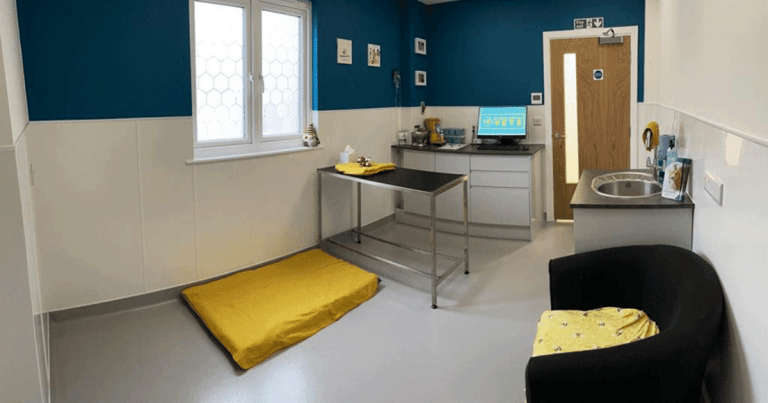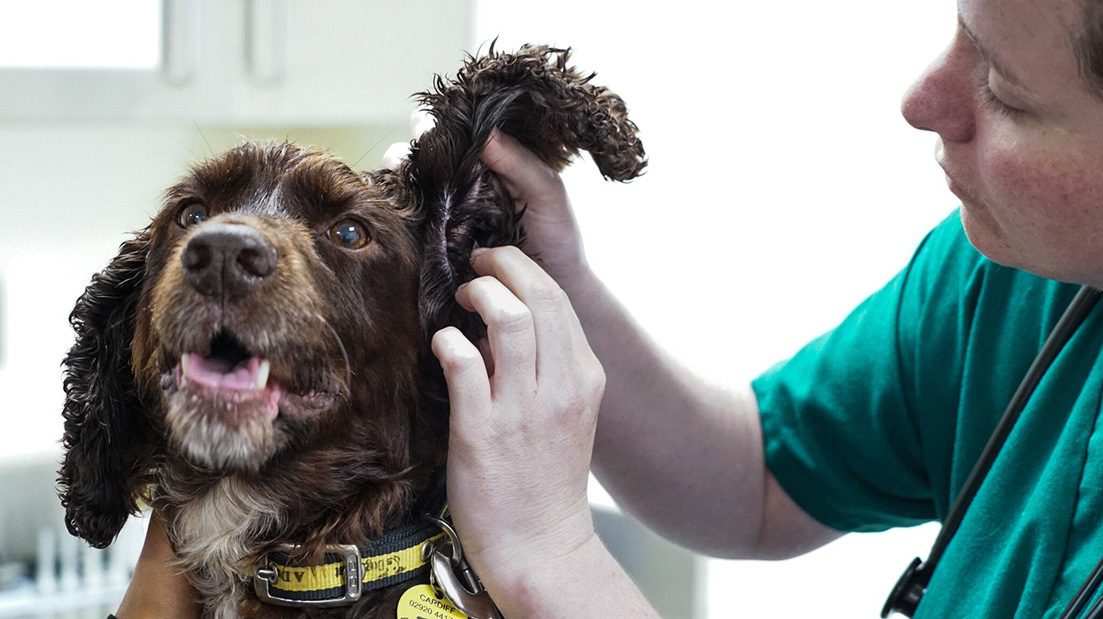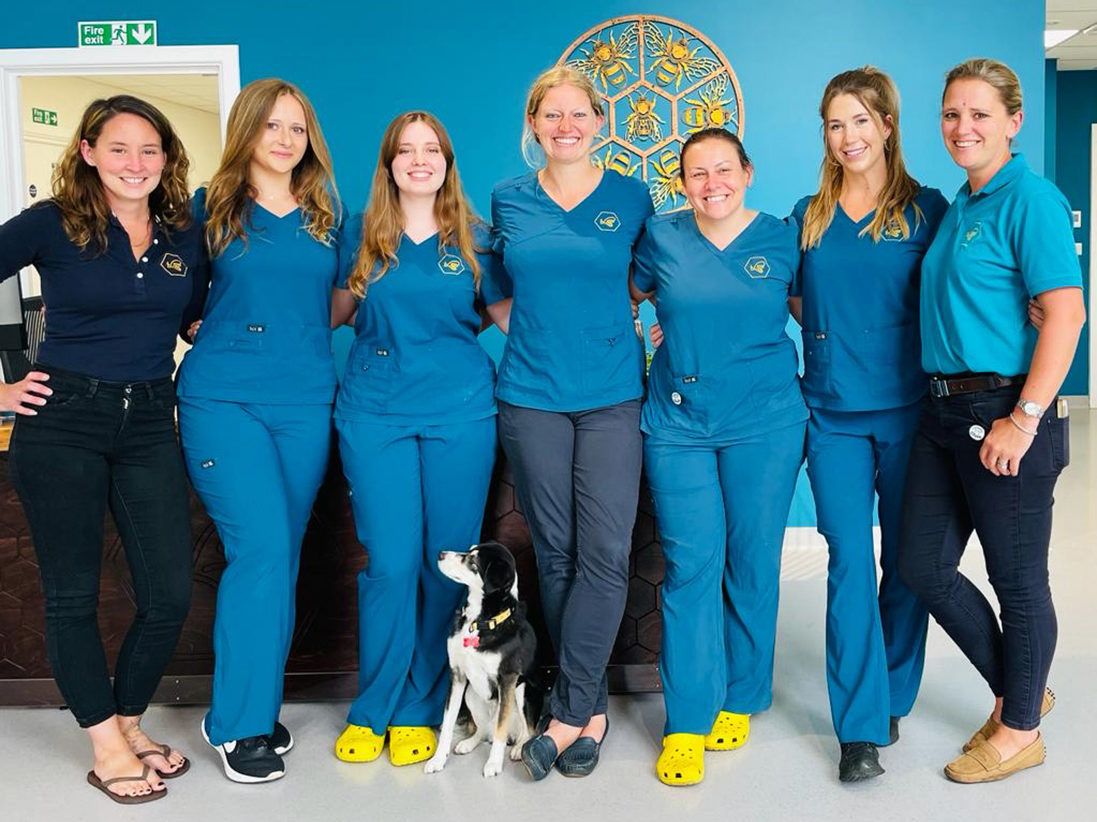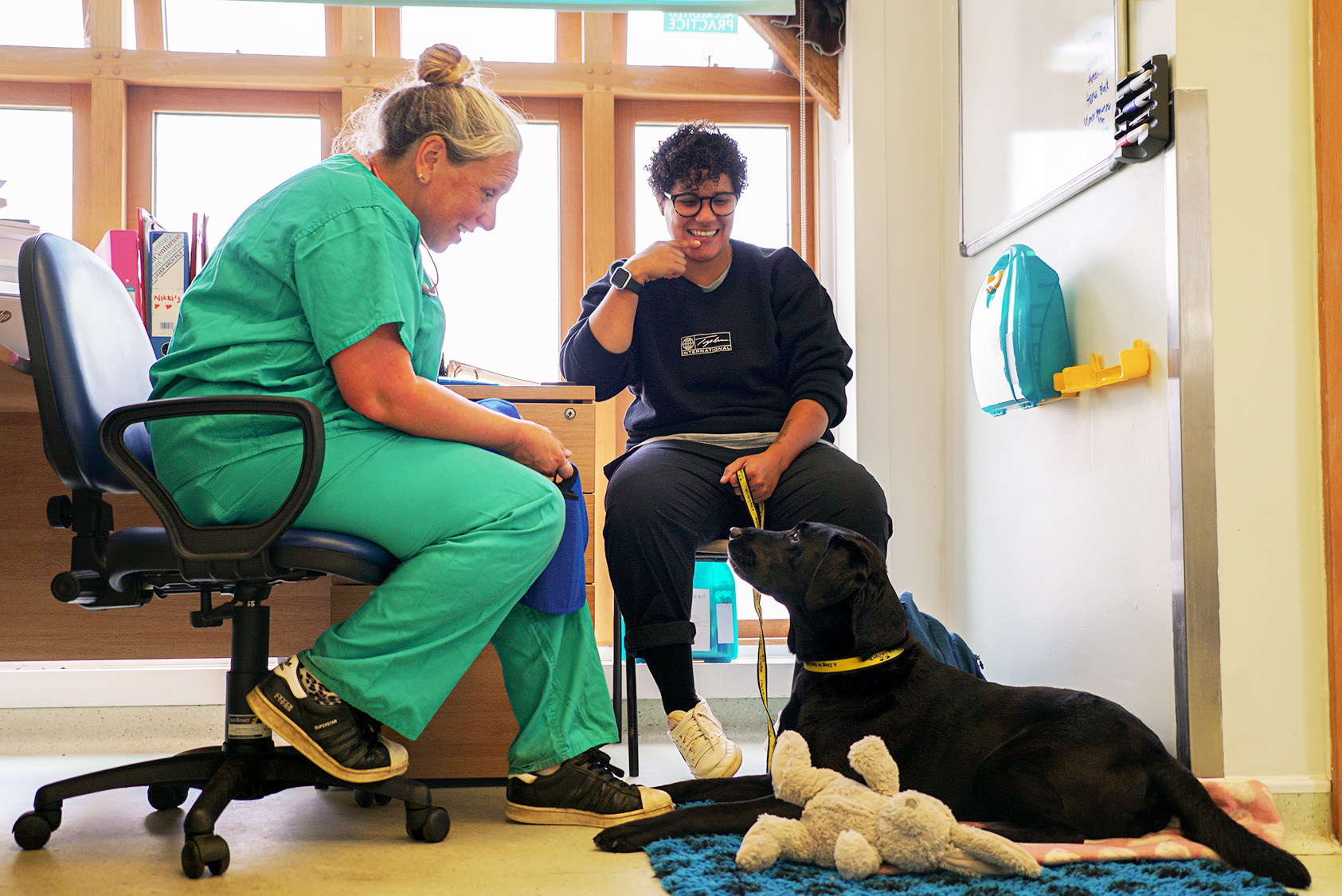9 Apr 2024
Tamsin Durston RVN explains the benefits of Dogs Trust’s Dog Friendly Clinic Scheme and how it can increase the client and clinic bond.

Dumbledore Vets’ clinic room. Image: Dumbledore Vets

Despite veterinary care being an essential part of dogs’ lives, many dogs find a visit to the vet stressful1.
Vet clinics are at the forefront of recognising and preventing the development of problem behaviours in dogs, and the Dog Friendly Clinic Scheme (DFCS) will help them develop the skills and knowledge to optimise the well-being of the dogs in their care.
Dogs Trust is very passionate about its DFCS, which was launched in March 2023 with the British Veterinary Behaviour Association (BVBA). Owners might visit clinics with their dog for a range of reasons, such as routine preventive health care, treatment of illness or injuries and monitoring of chronic disease.
It is hoped that through the scheme, Dogs Trust can help create a behaviour-focused veterinary community, which has animal welfare at the heart.
The DFCS covers introductions to dog behaviour and communication, guidance on preparing the clinical environment, expert advice for implementing behavioural knowledge and tools to help enhance clinic interactions.
The scheme also provides freely available resources for veterinary teams, including up-to-date knowledge on dog behaviour and practical tools on how to create a dog-friendly clinic. DFCS members also receive CPD aimed at increasing behavioural knowledge.
The scheme website provides free material, including introductions to dog behaviour and communication, guidance on preparing the clinical environment to optimise the emotional experience of vet visits for all, and practical tips for supporting owners with their dogs’ emotional and behavioural needs. This up-to-date knowledge serves as a tool for applying dog behavioural principles to create a dog-friendly clinic.
The trust is delighted that 77 clinics and nearly 80 individual members are now involved in the scheme and reaping the benefits involved, such as gaining access to a variety of increased staff safety and practice desirability, and optimising the emotional experience for dogs, their owners and the vet team.
One of the clinics that has joined the scheme is Dumbledore Vets, located on the Hampshire-Dorset border. Dumbledore Vets is a modern, independent small animal clinic providing a client-and-patient-focused approach to veterinary care.
Established in November 2022, the clinic has enjoyed huge growth of its clientele, with more than 600 dog-owning families registered at the practice so far.

RVN Leanne Willshire, from Dumbledore Vets, said: “We are so proud to be recognised as a dog-friendly clinic under this new and innovative scheme; we accept this accreditation with pride.
“As a new independent practice, we are thrilled to be recognised for delivering the highest standard of behavioural welfare to our canine patients, which has been so well received by our clients, who are not only impressed with our dedication to promoting positive emotional welfare, but also grateful to us too, for treating each dog as an individual.
“We’ve helped some of our canine patients overcome previous trauma, which is hugely rewarding, and to our new younger dogs, we are starting their veterinary journey off on the right foot.”
She added: “The clients who have joined us have become a part of our ‘Dumbledore family’, as we work together in delivering the very best veterinary care with a behaviourally centred and empathetic approach.
“We want to share our story and hope to inspire other practices to join this behaviourally centred community, and promote positive emotional welfare in veterinary practice.”
By joining the DFCS and pledging to reduce canine stress within the veterinary clinic, practices are directly improving canine in-clinic welfare. Canine welfare is also important outside the clinic.
A recently published paper from the longitudinal study, “Generation Pup”, documented that 31% and 35% of owners reported that their dog, at ages six and nine months respectively, was exhibiting behaviour that they found to be a problem2.
This can lead to stress and frustration for both the owner and their dog, potential safety issues, compromised canine welfare and, ultimately, a lessening of the bond between the owner and their canine companion. Problem behaviours have also been shown to be risk factors for both relinquishment and euthanasia3,4.
By joining the DFCS and utilising the veterinary resources available, clinics will be able to increase in-clinic behavioural knowledge and be able to advise and support owners with behavioural issues that occur outside the clinic.
Application of this knowledge within the veterinary clinic – alongside directing owners to the owner resources if appropriate – will help to improve the welfare of many canine patients. Alongside these benefits for canine welfare, many other benefits exist for both staff and practices if they join the scheme.
A study in 2019 highlighted that 55% of dog owners believed their dogs felt frightened when undergoing veterinary examination5.
More than one-third of dog owners surveyed in a study in 2011 believed that their dog “hates going to the vet”. This belief can lead to owners finding the thought of veterinary visits stressful which, in turn, can lead to a decrease in veterinary clinic visits.
By joining the DFCS, practice staff are informing clients that the veterinary clinic understands the importance of a positive veterinary visit. This will provide reassurance to all owners and increase the client-clinic bond.

Becoming a member of the scheme is a way for clinics to demonstrate to a client that it is dedicated to optimising their dog’s emotional experience, and clinics also show their commitment to their staff’s professional development, pledging that each staff member involved with patient and client care should have a basic understanding of canine behaviour and communication, canine learning theory, physiology of canine stress and the impact of the veterinary environment on canine patients.
The DFCS provides accessible online behaviour resources designed to support owners.
By directing owners to these resources, clinics show care and dedication, further increasing the client-clinic bond.
Resources cover topics such as:
The DFCS also provides veterinary clinics with detailed resources about how to run successful puppy socialisation and habituation events.
Many dogs find visiting the vet stressful. In some cases, this fear may escalate into aggression, which could cause injury to the owner or to veterinary staff members.
Joining the DFCS, and using the resources to help the practice make small changes to lessen stress for patients, should result in a reduced likelihood of aggression within the clinic and, therefore, increase staff safety.
Examples of this include changing the setup of the waiting area to separate dog and cat waiting areas, providing food treats during the visit, tailoring the examination and treatment to the individual, and making sure all team members apply considerate handling techniques when examining each patient.
The clinic focuses on providing pets with excellent medical, surgical and investigatory health care.
Operations director and co-owner of Watkins and Tasker Vets, Holly Charlton, said: “We have had our ISFM Cat Friendly Clinic accreditation for years, but we always felt there was something missing for the dogs.
“We were keen to be involved with this innovative idea. As a veterinary practice, we do not specialise in behaviour, so the DFCS has really helped us hone in on certain dog behaviour and characteristics which all the team are confident with.”
She added: “We have dedicated dog advocates for each of our branches who keep up to date with the latest dog-friendly advice and then pass this on to their colleagues, to ensure the whole team can help make a dogs visit to a veterinary clinic less stressful.
“We decided to join the DFCS, as we believe it is important that every animal is fully understood and that every animal deserves to feel as little stress as possible when visiting their vets.”
To find out more about the joining the scheme, veterinary clinics can visit the Dogs Trust website.